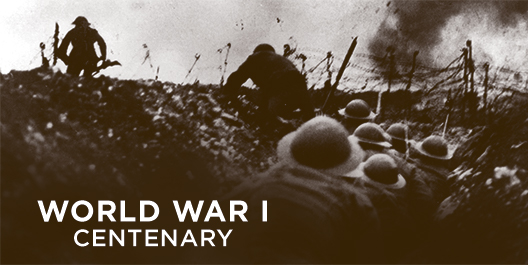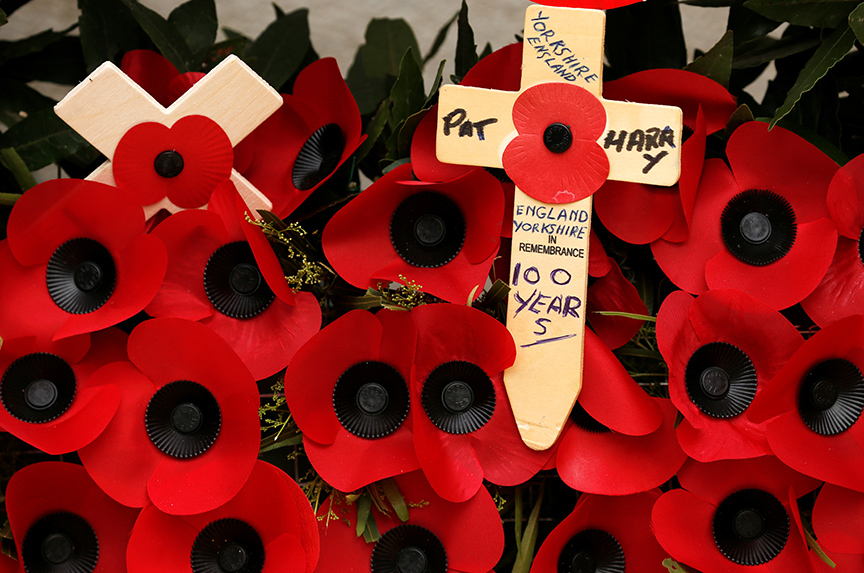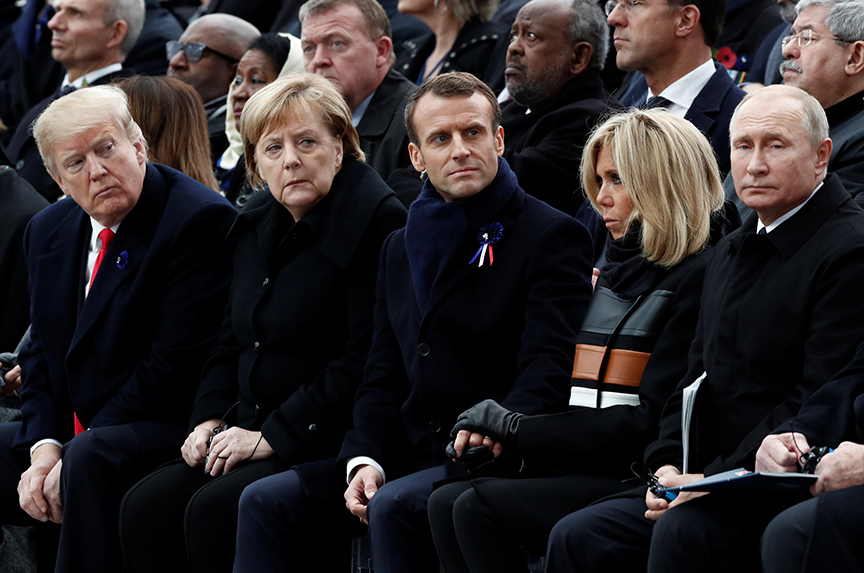The guns of war at last fell silent at the eleventh hour of the eleventh day of the eleventh month of 1918. The Great War was over. The Armistice took effect. The war had lasted more than four years; it had caused the death of close to ten million combatants and more than half as many civilians. An entire generation of European youth, supported by comrades from the United States and around the world, had met the fate foreseen by the young New Yorker Alan Seeger, who had enlisted in the French Foreign Legion even before the formation of the American Expeditionary Force: “I have a rendezvous with death / At some disputed barricade / … It may be he shall take my hand / And lead me into some dark land / And close my eyes and quench my breath.” Seeger was killed in action on July 4, 1916.

As every schoolchild knows, the Great War was meant to be short. No mass wars had been fought during the nineteenth century. After the Napoleonic Wars, the Great Powers meeting at the Congress of Vienna from November 1814 to June 1815 had created an international system, the Concert of Europe. The foresight of their statesmen, eloquently and movingly explained in Henry Kissinger’s doctoral thesis, A World Restored: Metternich, Castlereagh and the Problems of Peace 1812-1822 (1957), brought France back into the comity of nations. Later in the century, the rise of Prussia and the advent of a newly united Germany crushed France in the Franco-Prussian War of 1870-1871. Until then, for centuries, England and France had been natural and frequent enemies, but the menace of the German Reich thrust France and Britain together. The Entente Cordiale between them was signed in 1904.
On June 28, 1914, Gavrilo Princip, who had participated that day in a failed assassination attempt in Sarajevo against the heir to the throne of the empire of Austria-Hungary, Archduke Franz Ferdinand, and his wife, Sophie, happened upon them a short time later in a street where their carriage had turned by error and this time succeeded in his mission by shooting them both. This sparked the July Crisis and the declaration of war by Austria-Hungary against Serbia and, in fulfillment of the terms of a series of interlocking and sometimes conflicting treaties, provoked subsequent declarations of war by the members of the Triple Entente—France, Russia and the United Kingdom—and by the Triple Alliance consisting of Germany and Austria-Hungary (and, for a short time, Italy).
The world of a century ago was a world of empires: the British and French Empires spanned the globe, the Dutch, Belgian, Italian and Danish as well, in smaller measure. It was a world of globalized trade and open movement: if you were privileged enough to travel, you could cross Europe with only your calling card. It was a world in which government was largely absent from daily life: A.J.P. Taylor, in his England 1914-1945 (1965), reminds us that at this time “a sensible law-abiding Englishman could pass through life and hardly notice the existence of the state, beyond the post office and the policeman.” It was a world of aristocracy and of hierarchy, where those who held authority exercised it and those who did not obeyed it: Taylor tells us that it took but the king, two courtiers, and one minister to declare war.
When the war began, the Schlieffen Plan was based on Germany’s defeat of France in four weeks, followed by an attack on Russia, which would not have had time to fully mobilize. Instead of this short war, entrenched warfare ensued and wave upon wave of European and imperial youth fought prolonged battles on land, on the sea, and in the air. For not only had populations grown throughout the relatively irenic nineteenth century, industrial and war-making might had expanded beyond anyone’s full comprehension. As Winston Churchill wrote in his history of the war, The World Crisis (1923): “The vials of wrath were full: but so were the reservoirs of power.”
The Americans entered the war late, in 1917, but with great vigor and valor. Jean-Michel Steg, in his remarkable La Fayette nous voici! (2018) depicts the bravery of the Marines at Belleau Wood and the broader contribution of the US troops, not fully mobilized until the spring of 1918, which was decisive in tipping the balance in favor of the democracies.
The negotiations of the Treaty of Versailles with Germany and the other treaties of peace with the remaining defeated Central Powers—Austria-Hungary and the Ottoman Empire as well as Bulgaria —revealed the divisions among the victors. Woodrow Wilson suggested a form of world government based on national self-determination which became the League of Nations but which the US Senate, despite support for Wilson’s plan among the American people, failed to endorse. Yet this vision meant the artificial partitioning of Austria-Hungary, with tensions among communities which have lasted to this day. Similarly, the League of Nations mandates, especially in Palestine, Syria, and Iraq, remain areas of tension in our own time. Meanwhile, France recovered Alsace and Lorraine and occupied the Rhineland. Most of all, punitive and indeed unrealistic monetary reparations were imposed on Germany, denounced by John Maynard Keynes in his masterful The Economic Consequences of the Peace (1919) and creating lasting resentment in Germany.
The interwar years, in essence, represent a response to the slaughter and chaos of the Great War. The United States retreated into isolation and after the stock market crash of 1929 became absorbed in nursing the wounds of the Great Depression. Britain and France failed entirely to face the rise of populist, nationalist regimes in Europe. The advent of National Socialism in Germany can be traced directly to the Versailles provisions and the disruption of the Weimar Republic and the incipient great inflation. Italian Fascism, too, was a choice in favor of strength and order.
After Adolf Hitler invaded Poland on September 1, 1939, the United States once again held back from direct involvement in a European war. Winston Churchill, the British prime minister, and Franklin D. Roosevelt, the American president, met in Placentia Bay off the coast of Newfoundland in Canada in August 1941 to sign the Atlantic Charter, the basis for the postwar world order and the first use of the expression “the United Nations.” By January of 1942, nearly thirty countries had signed as the United Nations and, upon the Japanese empire’s attack on Pearl Harbor on December 7, 1941, the United States had entered the Second World War.
When that war was over the victorious allies—led by Britain and the United States and joined by France—laid the further groundwork for the liberal international order which prevailed until it came under threat just in the past three years. That world order, based on the rule of law and the overwhelming economic and military power of the United States, saw the birth of the United Nations and military alliances of which NATO was at the forefront. It also consists of the international financial institutions—the International Monetary Fund and the World Bank—agreed at the conference at Bretton Woods in New Hampshire in July 1944, even before the war’s end, and grippingly recounted by Benn Steil in his The Battle of Bretton Woods (2013).
It is important to understand that the statesmen who put in place the postwar order had all experienced the First World War: Churchill, de Gaulle, Roosevelt; as well as the founding fathers of the nascent European Union and subsequent national leaders of postwar Europe: Jean Monnet, Robert Schuman, Konrad Adenauer, Alcide De Gasperi. They wished to create a system that would heal the scars of the First World War as well as the Second.
It became apparent soon after the end of the Second World War that communist Russia was an adversary more than the ally it had been during the period of hostilities. The Soviet sphere of influence in Eastern Europe, the Truman Doctrine, and the Marshall Plan for the rebuilding of Western Europe formalized the Cold War, which divided the globe into the Free World, the Communist World, and the Non-Aligned World. In this frozen system, the postwar institutions functioned, largely for the benefit of the Free World for which they were principally designed.
In 1968, half a century ago and fifty years after the end of the First World War, upheavals arose in France and the United States in particular, but also within the communist bloc in Eastern Europe, especially the Prague Spring. Over the next two decades came a gradual undermining of the Soviet sphere of influence and aspiration for the liberation from totalitarian regimes of the countries of Eastern Europe. Still, when the Berlin Wall was torn down in 1989 and when the Soviet Union subsequently crumbled, few were prepared for these events or their consequences.

Remembrance crosses and plastic poppies are seen on the war memorial cenotaph after a Remembrance Sunday commemoration ceremony on Armistice Day, one hundred years after the end of World War I, in Floriana, Malta, on November 11. (Reuters/Darrin Zammit Lupi)
In the aftermath of the end of communism and at the beginning of a new era of globalization, Francis Fukuyama argued, in his book The End of History and the Last Man (1992) that the world was now poised for an era of unimpeded democracy and capitalism. He could not have been more wrong. The more salient argument, as history was to show, was that made by Samuel Huntington in his book The Clash of Civilizations and the Remaking of World Order (1996).
But even more revelatory and prescient was the thesis posited by Philip Bobbitt in his chef d’œuvre The Shield of Achilles: War, Peace and the Course of History (2002). Bobbitt advances the idea that the peace processes following major wars alter the governance structures in the name of which those wars were fought. Hence we proceed, from the Renaissance through the Peace of Westphalia through the nineteenth century from the princely state to the kingly state to the state-nation to the nation state. Bobbitt views the First World War, the Second World War, and the Cold War as a single conflict, which he names “The Long War.” In Bobbitt’s conception, the Long War was fought in the name of democracy against Prussian totalitarianism, Fascism, and then Soviet totalitarianism. At the issue of the Long War, however, the governance structures were altered by the nature of the war itself, so that instead of reinforcing the national democracies in whose name it was fought, the Long War had created a new type of state, the market state.
The governing bodies of the world were caught unawares by the successes of their own creation. Globalization after the fall of the Berlin Wall in 1989 and the collapse of the Soviet Union ushered in a period of astonishing prosperity as the former Communist World and the former Non-Aligned World —emblematically represented by China and India, respectively—became integrated into the global system, particularly the world economic system of open trade, largely unfettered investment and worldwide markets.
The so-called global financial crisis of 2007-2008, which was in fact first American and then European, revealed the shortcomings of unbridled self-regulating capitalism. Had it not been for the experience and policies of the US Federal Reserve and the European Central Bank, as well as the Bank of England, which all flooded their economies with free cash, the West would have been plunged into the same Great Depression as in the 1930s. But the safeguarding of the financial system came at a cost: none of the perpetrators were punished and many members of the public in Western societies suffered the negative consequences upon their incomes, their employment, their savings.
This was not slaughter and chaos on the scale of the First World War. But it was suffering and disorder from the point of view of the common man. While hundreds of millions of people in the developing world reached new heights of wealth, security, and comfort, ordinary people in many of the Western democracies felt short-changed by globalization and by their own leadership classes who had perpetrated and defended that globalization.
After the financial crisis of 2008, Queen Elizabeth II asked: “If this was so big, why did no one see it coming?” The question was valid and the same question might be asked of the purblind reaction of the global elites to globalization as a whole.
This inability of leaders to predict and to repair the transition to Bobbitt’s market states has led to the backlash which we observe today. First in the chronological sequence comes the vote in favor of Brexit, defended by liars in support of an entirely unrealistic imaginary nostalgia. The act of self-amputation represented by Brexit could mean a generations-long wilderness for Britain. Next in the sequence comes the election of Donald Trump in the United States. At first the American and global elites considered him a bumbling buffoon; now they realize he is a devilish mastermind who has captured the fundamental anxieties and provoked the basest responses in simple people—and who has a plan. And these fracturing trends have been reinforced by the newfound patriotic nationalism of Russia, which nobody succeeded in reintegrating into the European family; by the increasingly autocratic and recidivist actions of President Recep Tayyip Erdoğan of Turkey; by the arrival of Chancellor Sebastian Kurz in Austria and the consolidation of power by Prime Minister Viktor Orbán of Hungary; by the election of Jair Bolsonaro as president of Brazil and the rule of President Rodrigo Duterte in the Philippines; by the rise of Alternative für Deutschland and the attempted revival of the French Front National as the newly-named Rassemblement National; and by the determination of Steve Bannon to ensure that his far-right, populist, nationalist The Movement scores well in the European Parliament elections in May 2019.
Gideon Rachman, writing in the Financial Times likens the differences in worldviews between France’s president, Emmanuel Macron, and Trump to the conflicting conceptions following the First World War, populist nationalism versus Wilsonian internationalism. On November 11, Macron leads seventy world leaders in a tribute to the dead of the First World War at a ceremony at the Tomb of the Unknown Soldier at the Arc de Triomphe in Paris. And the next three days in Paris will be devoted to a newly-organized annual Paris Peace Forum, which Trump is not attending, but which will welcome leaders from many other major countries as well as representatives of global civil society.
Comparing 1918 and 2018 stretches the parallel, but is not without merit. The world is very different today from a century ago and many aspects are better: science, health, prosperity. Global inter-connectedness, sensitivity to gender and other societal issues, a vastly higher level of average education are all improvements since a century ago. In geopolitical terms, the reconciliation between France and Germany is complete and was movingly symbolized by Macron and the German chancellor, Angela Merkel, visiting together the site at Compiègne where Germany signed the surrender in 1918 and where Hitler insisted that France should surrender in 1940. The European Union, for all its shortcomings, represents the greatest beating of swords into ploughshares in the history of mankind.
Yet the problems of today are also global, climate change first among them, together with the despoiling of the only habitat which humankind has and the destruction of the Earth’s biodiversity by the selfish profligacy of modern man. The rise of artificial intelligence will require regulation, in peace and in war, that can only be achieved through international cooperation. In order to restore trust in institutions, public and private, government bodies, corporations, banks and others must act not only in defense of particular advantage but in the general interest. Individuals and institutions must be taught a new respect for truth. Leaders must recognize problems with a sense of reality, not merely aspire to continue in office and appear at Davos.
So while many things are better than they were in 1918, in other ways the world has come full circle and, with increased rivalries and hostility, has taken a turn for the worse. If we want to understand the significance of discord and division in international relations, and their potential impact on human life, we should recall that Churchill’s use of the phrase “the vials of wrath” was a reference to the sixteenth chapter of the last book of the New Testament of the Christian Bible, the Book of Revelation: “And I heard a great voice out of the temple saying to the seven angels, Go your ways, and pour out the vials of the wrath of God upon the earth” and the sea and the rivers became blood and the sun was given the power to scorch men with fire and the water of the Euphrates was dried up and they were gathered in a place called Armageddon and there came a great voice out of heaven saying: “It is done.”
Nicholas Dungan is a nonresident senior fellow in the Atlantic Council’s Future Europe Initiative, a senior research fellow of the French Institute for International and Strategic Relations, and an adjunct faculty member of Sciences Po Paris. Follow him on Twitter @Nicholas_Dungan.
Image: From left: US President Donald J. Trump; German Chancellor Angela Merkel; French President Emmanuel Macron and his wife, Brigitte Macron; and Russia President Vladimir Putin attend a commemoration ceremony for Armistice Day, one hundred years after the end of the First World War, at the Arc de Triomphe in Paris, France, on November 11. (Reuters/Benoit Tessier/Pool)
